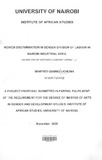| dc.contributor.author | Lichuma, Winfred O | |
| dc.date.accessioned | 2013-06-28T13:44:24Z | |
| dc.date.issued | 2006 | |
| dc.identifier.citation | M.A | en |
| dc.identifier.uri | http://erepository.uonbi.ac.ke:8080/xmlui/handle/123456789/41855 | |
| dc.description.abstract | This study investigates the women discrimination in industrial labour. It is an
analysis of Santowels Company Limited. The overall objective of the study was to
analyse the industrial gender division of labour in Kenya establishing the constraint
that have caused women to be the unprivileged class, thus causing economic
marginalization.
The study used questionnaires that were formulated to assist the key informants
who included the management and employers of Santowels Company Limited.
The assumptions made were that social-cultural factors that favour patriarchy
have the greatest influence on women participation in gainful employment and that
the participation of women in formal employment is complicated by the women
triple roles that make them ineffective.
Amongst the hypothesis that the study set to operationalize were that women are
marginalized in labour markets with majority of them hired as casual labourers,
since most employers prefer to hire men as opposed to women.
The company under study was selected based, on the nature of its activities that
were considered light enough to be undertaken by both genders satisfactorily in
the industrial area of Nairobi. The key informants were selected purposively from
the employees.
The findings of the study show that gender inequalities are experienced in
industrial labour and women are mostly discriminated and marginalized. Most
women interviewed were engaged as casual labourers. Women production in
industrial labour was found to be very low as compared to men.
The study makes a case that there is a correlation between education levels that
appear to influence the employment categories of women. The factors influencing
the marginalization of women in employment as established by the study are
cultural stereotypes in the sexual division of labour; low levels of education and
training amongst women; lack of opportunities suitable for women and overall lack
of representation of women in decision-making levels.
The study concludes that there is need for the government to create an enabling
environment to enable more women to seek industrial employment. Among the
specific recommendations are that there is need to review and amend the existing
laws and policies to allow women the right to participate equally in economic
activities. Policies that are gender sensitive need to be formulated to ensure that
women are not marginalized. Above all women should be sensitized to be more
aggressive in pursuing employment and to learn how to balance their triple roles. | en |
| dc.description.sponsorship | University of Nairobi | en |
| dc.language.iso | en | en |
| dc.publisher | University of Nairobi | en |
| dc.title | Women Discrimination in Gender Division of Labour in Nairobi Industrial Area: "an Analys of Santowels Company Limited." | en |
| dc.type | Thesis | en |
| local.publisher | Institute Of African Studies, Faculty of Arts, University of Nairobi | en |

